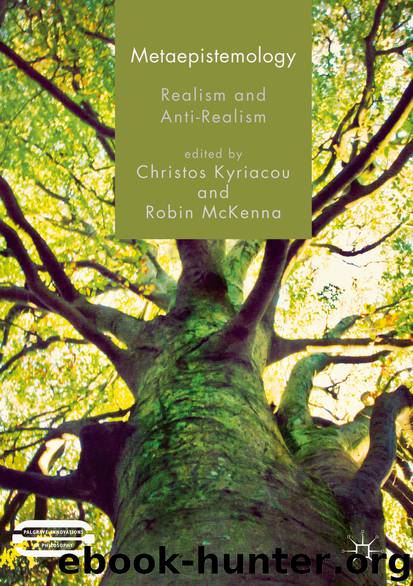Metaepistemology by Unknown

Author:Unknown
Language: eng
Format: epub
ISBN: 9783319933696
Publisher: Springer International Publishing
4 The Thin Epistemic Normativity Strategy
4.1 Thin Epistemic Normativity
We think moral error theorists should use the distinction between thin and robust normativity to reject Cuneo’s parity premise. Instead of defending the epistemic error theory , they should reject the idea that epistemic facts are robustly normative in the first place. Instead, they should maintain that epistemic thoughts and claims are only thinly normative. Although they essentially imply norms or standards, they do not imply robust reasons. To put the point another way, although the authority platitude is true of morality, it is not true of epistemology. It is not an essential part of our conception of epistemic facts that they are robustly normative.
We can think of two reasons to suggest that epistemic norms are thin in a way that moral norms are not. The first has to do with the possibility of knowledge without accountability. The second has to do with some surprising features of the epistemic “ought.”
Animals are not subject to moral standards. Your dog’s actions cannot be morally right or wrong. More generally, since animals lack the rational capacities needed for agency and attributions of responsibility, they are exempt from robustly normative standards. They cannot have robust reasons that apply to them and the “oughts” that require such reasons do not apply to them.
At the same time, non-human animals can have knowledge. Their beliefs can therefore be epistemically successful or defective even if we wouldn’t say that such attitudes could be justified or that these animals have met their intellectual responsibilities. That they can meet or fail to meet certain epistemic standards would be puzzling if epistemic standards were robustly normative. Since animals are exempt from robustly normative standards, they could not have knowledge if knowledge were like moral rightness in requiring conformity to robust reasons. So, another reason why thin epistemic normativity is more plausible than thin moral normativity is that unlike moral standards, epistemic standards can apply to animals even though they cannot be held accountable.3
There is a point, often credited to Harman (1986), which is also important to consider. He thinks that we aren’t subject to criticism for failing to fill our heads with as many of the obvious consequences of uninteresting claims as we can. If you would see, for example, with just a moment’s reflection that something is logical consequence of the fact that the state beverage of Delaware is milk, it’s unlikely that we’d think that this is something you ought to believe. Notice that this isn’t because your epistemic position with respect to this claim might be weak. Far from it. It might be better than many of the things that you may believe. It might be better than many of the things that you ought to believe. Still, if you don’t believe it, it’s unlikely that you can be subjected to criticism for this.
This observation seems to indicate a strange difference between the moral “ought” and the epistemic “ought.” In any plausible moral outlook, there will be some things that
Download
This site does not store any files on its server. We only index and link to content provided by other sites. Please contact the content providers to delete copyright contents if any and email us, we'll remove relevant links or contents immediately.
Should I Stay or Should I Go? by Ramani Durvasula(7644)
Why We Sleep: Unlocking the Power of Sleep and Dreams by Matthew Walker(6691)
Fear by Osho(4724)
Flow by Mihaly Csikszentmihalyi(4683)
Rising Strong by Brene Brown(4444)
Why We Sleep by Matthew Walker(4429)
The Hacking of the American Mind by Robert H. Lustig(4368)
How to Change Your Mind by Michael Pollan(4348)
Too Much and Not the Mood by Durga Chew-Bose(4333)
Lost Connections by Johann Hari(4168)
He's Just Not That Into You by Greg Behrendt & Liz Tuccillo(3876)
Evolve Your Brain by Joe Dispenza(3661)
The Courage to Be Disliked by Ichiro Kishimi & Fumitake Koga(3477)
Crazy Is My Superpower by A.J. Mendez Brooks(3390)
In Cold Blood by Truman Capote(3374)
Resisting Happiness by Matthew Kelly(3335)
What If This Were Enough? by Heather Havrilesky(3302)
The Book of Human Emotions by Tiffany Watt Smith(3289)
Descartes' Error by Antonio Damasio(3268)
